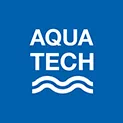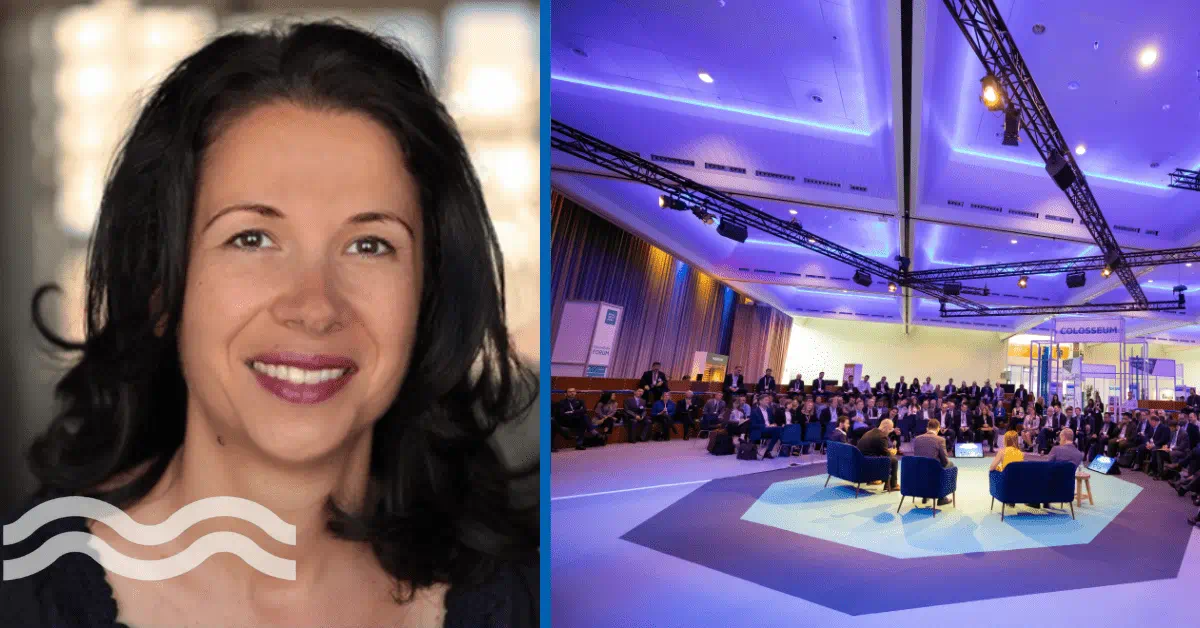After some reflection, Gaetane Suzenet shares her thoughts from her time at Aquatech Amsterdam and the Innovation Forum.
Original conference programming
One of the main things I like about this event is that it’s a programmed very differently to other conferences I’ve attended. It’s designed to be very original and this year, the organizers really cracked it!
The European Water Tech Accelerator hosted a Lunch Table on the topic of Investment and Acceleration. It was a well-attended table so thank you to my guests! We are very proud that two of our member companies Watergenics and Shayp were among the four participants in the Digital Derby Competition – a highly interactive and innovative pitching session.
Since then, I have been reading a lot of articles, blogs and watching a few videos about the key takeaways from the Innovation Forum and Aquatech exhibition. After some reflection, I would like to take a different perspective and summarise what the different opinions and thoughts could mean for the future of the water sector. Here are my four takeaways:
1) Defining agility in water
The title of the Innovation Forum this year was ‘Accelerating water agility, together’. The partnering aspect was very much a key focus, however, I would like to focus on the agility aspect. The definition of agility is “the ability to move quickly and easily or the ability to think and understand quickly”. This is what the future of the water sector needs to be about. If we want to ensure we can face the challenges such as the rapidly changing climate or the rising energy prices, the sector will have to become more agile in managing its processes, in responding to economic and societal fluctuations. Agility isn’t a term often used with regards to water but perhaps this could be the start!
2) Rethinking business models
The Forum was very topic-focused, e.g., clean energy, PFAS, circular economy, digital and AI. These are all the topics we need to consider for a sustainable water future. Nonetheless, I participated in the opening panel discussion and it became quickly clear that agility is also about rethinking the business and economic models.
Agility cannot only be technology or topic-focused. If we want a sustainable water future, we also need to think about how we financially sustain water and wastewater management, and how water innovations can be attractive for investment. For instance, wastewater treatment and management will increasingly be in great demand by utilities and industries. How do we ensure wastewater technologies can be largely deployed?
Infrastructure funding is one way forward. This cannot only go to energy if we want to take carbon emission reductions seriously. Investing in wastewater technologies and infrastructure must become a priority, to the extent we do for renewable energy.
3) Net Zero or Not Zero?
Are Net Zero targets really achievable? Is it a realistic objective beyond the wishful thinking? Even after attending the Net Zero journey session, it would be difficult for me to answer this question. This target is a challenging one and it cannot be denied that the European water utilities are doing their share. They are helped by engineering companies or technology providers, who are working on both sides, and acting on their own emissions.
It won’t be a surprise if I say the water industry cannot be only one investing to reach the target. We were missing other parties in the room. Reaching the Net Zero target is a collective effort. How can we ensure the cumulative impacts of each sector’s efforts will positively pay off? Certainly, I would recommend we expand the audience next time to have a wider perspective.
4) International technology offerings – where’s Europe?
I briefly went to the exhibition and the good news, I would say, is that there is no lack of technologies and products to manage water and wastewater and implement circular economy practices. One reflection though is the technology supply is increasingly international and global. What does it mean for Europe?
Running the European Water Tech Accelerator, it is a genuine question, and we start seeing relevant and to-the-point innovations coming from other continents. The billions invested in R&D in Europe should put EU innovations at the forefront. Yet, this is not yet the case. There is an urgent attention to be put on how we see the future approach to European R&D and innovation policy.
The US and Europe have very similar issues when it comes to investment and acceleration. Should the future be about building bridges to support both aspects?






